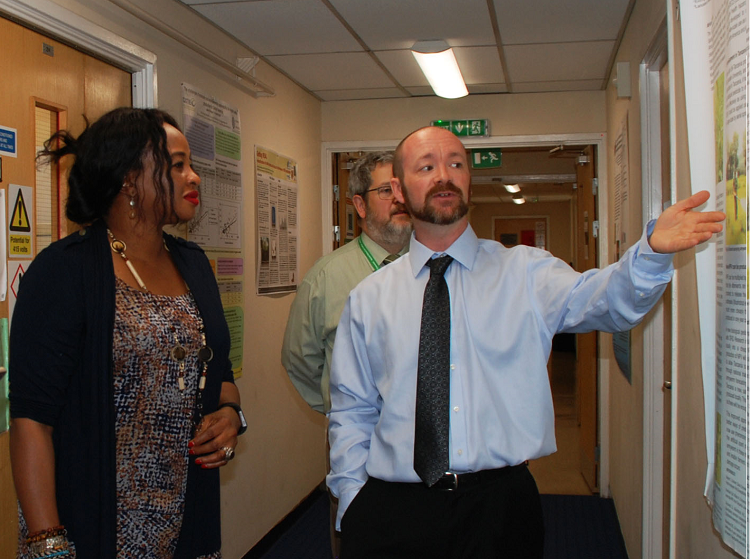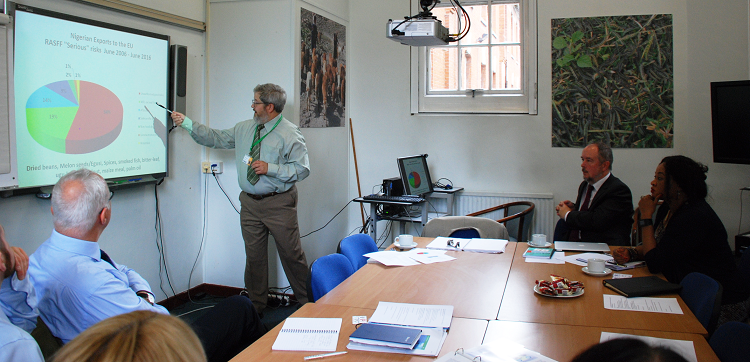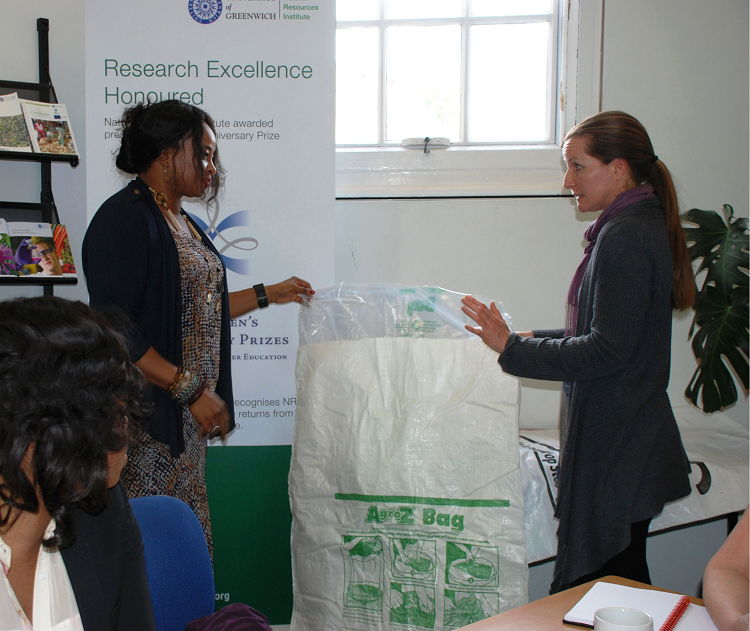
Knowing that the food we eat is safe is important to us all. But what exactly is meant by food safety, and who is responsible for it? These topics were discussed at a round-table meeting on 30th June 2016, when a delegation from the Nigerian Senate Health Committee met with a team of experts at NRI. The Nigerian delegation included Dr Rukevwe Ugwumba, Consultant and Committee member of the Nigerian Federal Senate Committee on Health, and Mrs O. Omobo, Consultant with the World Health Organisation (WHO).
As a scientific discipline, food safety is concerned with the handling, preparation and storage of food in ways that prevent foodborne illness. Concerned by annual figures reporting how millions of people fall ill and many die as a result of eating unsafe food, in 2000 the WHO adopted a resolution to recognise food safety as an essential public health function. This stipulates that food safety policies and actions need to cover the entire food value chain, from production to consumption, or from ‘field to fork’. NRI has a long history of expertise in agriculture, food safety, postharvest technology and international trade – constituting a ‘value chain of expertise’ for devising solutions to food safety risks.
 The meeting at NRI on the 30th June was part of a visit to Europe by the Nigerian Senate Health Committee, with the objective of forming collaborative partnerships with organisations and research institutes across the region who have expertise in improving food safety management in the Nigerian context. The meeting was planned together with Dr Louise Abayomi, NRI Postharvest and Food Safety Specialist based in Nigeria. The driver for this meeting was a ban on the export of dried beans from Nigeria to the EU following a number of rejected shipments of beans containing residues of the unauthorised organophosphate pesticide ‘dichlorvos’.
The meeting at NRI on the 30th June was part of a visit to Europe by the Nigerian Senate Health Committee, with the objective of forming collaborative partnerships with organisations and research institutes across the region who have expertise in improving food safety management in the Nigerian context. The meeting was planned together with Dr Louise Abayomi, NRI Postharvest and Food Safety Specialist based in Nigeria. The driver for this meeting was a ban on the export of dried beans from Nigeria to the EU following a number of rejected shipments of beans containing residues of the unauthorised organophosphate pesticide ‘dichlorvos’.
 NRI’s Dr Andy Graffham began proceedings with an overview of the management of food safety and wider sanitary and phytosanitary (SPS) issues, with a focus on Nigerian food exports to the European Union (EU). SPS refers to measures to protect humans, animals, and plants from diseases, pests, or contaminants. Dr Graffham identified the food business sector and government authorities as responsible for ensuring food safety in varying capacities and at different levels.
NRI’s Dr Andy Graffham began proceedings with an overview of the management of food safety and wider sanitary and phytosanitary (SPS) issues, with a focus on Nigerian food exports to the European Union (EU). SPS refers to measures to protect humans, animals, and plants from diseases, pests, or contaminants. Dr Graffham identified the food business sector and government authorities as responsible for ensuring food safety in varying capacities and at different levels.
The NRI team discussed with the visitors a variety of initiatives for improving food safety. Linda Nicolaides, Microbiologist and expert in Food Safety & Quality Management (FSQM) presented NRI’s suite of specialist training courses in Food Innovation and Food Safety & Quality Management (FSQM), noting especially the FSQM ‘route’ for government officials and the soon-to-be-launched e-learning distance programme. Dr Tanya Stathers, expert in Postharvest Storage, Food Security and Adaptation, spoke about the ‘Training of Trainers’ – the capacity building of individuals who will go on to train the next generation of experts in their own countries. Dr Graffham also mentioned adaptation to local context when referring to ‘national interpretation guidelines’ of global standards.
 Dr Stathers, who has extensive field experience across East and Southern Africa, remarked how the grain storage options readily available to farmers are not always the safest or the most effective. “It is our job to make people aware of the alternatives,” she said, citing different storage bag options including AgroZbags, PICS bags and Grain Pro Super Grain Bags, which have been developed to protect stored grain from insects. The bags are relatively low cost (approximately US$ 2), and composed of an outer woven sack, with one or two inner bags made of airtight polythene. When filled with grain and tightly closed, levels of carbon dioxide build up, causing any insect life-stages present in the grain to die. The bags are effective as long as they do not get punctured. NRI has been involved in several projects across sub-Saharan Africa comparing these options and supporting people in using and testing them. Various companies are now producing these bags for distribution and local sale.
Dr Stathers, who has extensive field experience across East and Southern Africa, remarked how the grain storage options readily available to farmers are not always the safest or the most effective. “It is our job to make people aware of the alternatives,” she said, citing different storage bag options including AgroZbags, PICS bags and Grain Pro Super Grain Bags, which have been developed to protect stored grain from insects. The bags are relatively low cost (approximately US$ 2), and composed of an outer woven sack, with one or two inner bags made of airtight polythene. When filled with grain and tightly closed, levels of carbon dioxide build up, causing any insect life-stages present in the grain to die. The bags are effective as long as they do not get punctured. NRI has been involved in several projects across sub-Saharan Africa comparing these options and supporting people in using and testing them. Various companies are now producing these bags for distribution and local sale.
 Other NRI staff members who contributed to the discussion were NRI Deputy Director Ben Bennett, Professor of International Trade and Marketing Economics, Uli Kleih, Marketing Economist, Dr Corinne Rumney, Microbiologist, and Simon Springate, expert in Insect Pest Management.
Other NRI staff members who contributed to the discussion were NRI Deputy Director Ben Bennett, Professor of International Trade and Marketing Economics, Uli Kleih, Marketing Economist, Dr Corinne Rumney, Microbiologist, and Simon Springate, expert in Insect Pest Management.
Meeting delegates agreed that the goal remains improving food safety practices and standards across the board in Nigeria. The Nigerian Health Committee considers collaboration with UK organisations especially important – particularly taking into account the UK’s huge Nigerian community representing an important market for Nigerian products. The visitors thanked the NRI team for their expertise and passion for the subject area, and Dr Ugwumba concluded that the work of the Institute “...will be important in Nigeria, not just for beans but for the whole agricultural sector.”
Links: FSQM programmes at NRI | MSc in Food Innovation |

